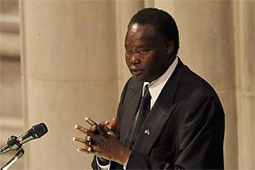Ambassador will speak on South Sudan referendum
The vote allows South Sudan to opt for independence, but many fear North will not go along

Sudanese Amb. to the United States Akec Khoc
The self-determination referendum gives South Sudan the opportunity to vote for independence from the North. The vote was provided for in the Comprehensive Peace Agreement that ended the Sudanese civil war in 2005. Top officials on both sides have committed to holding the referendum on time and to respecting the outcome.
However, many people in South Sudan and the international community worry that the government in Khartoum, in North Sudan, will not go along if the South votes for independence. Many fear a return to the violence that plagued the country during the civil war, which raged from 1983 until the peace agreement was signed.
The divisions between North and South are often linked to differences in ethnicity, religion and resource distribution. The North is more urbanized, and is a desert region populated mainly by Muslim Arabs. The South is more rural, with a large pastoral, nomadic population; it is mainly populated by black Africans who practice traditional beliefs or Christianity. The South is rich in oil fields which account for a significant portion of Sudan’s exports, and many there feel their region has not received an equitable share of the oil revenues.
Voter registration began over the past month, but many aspects of the post-referendum arrangements remain unclear. Negotiations between the North and South have stalled at several points, but recently restarted with involvement from the African Union and other outside actors. The North and South need to reach agreement on issues of citizenship, international debt, natural resource management and security, among many others, in order to ensure stability for the region.
Another key issue is the future of border regions, including the Abyei region, which is an extremely resource-rich area, as well as the Nuba Mountains and the Blue Nile area. The three regions are currently under the control of North Sudan, but will have the option to join South Sudan.
Ambassador Khoc is visiting Brandeis under the auspices of the student group Justice, Peace and Conflict. Sponsors include the Master's Program in Coexistence and Conflict, the International and Global Studies Program, the Graduate Program in Global Studies, the Master’s Program in Cultural Production, the Master's Program in Sustainable International Development, the Heller School of Social Policy and Management and the International Center for Ethics, Justice, and Public Life.
After the ambassador's speech, members of the student group will moderate a question and answer session, which will be followed by a light buffet. The event is free and open to the public.
Categories: International Affairs





